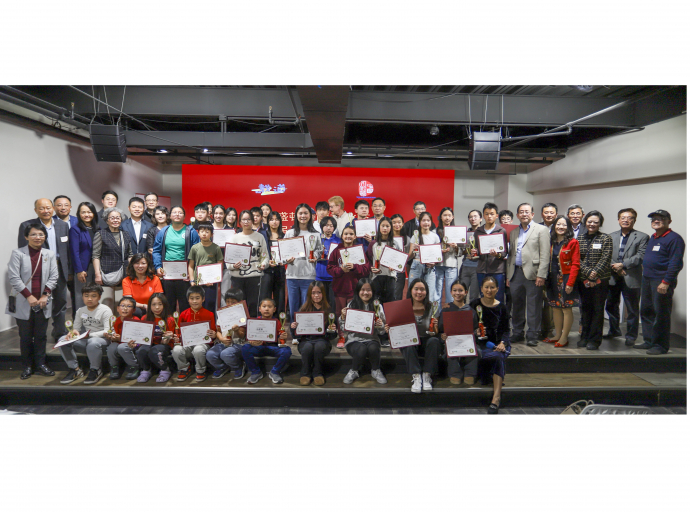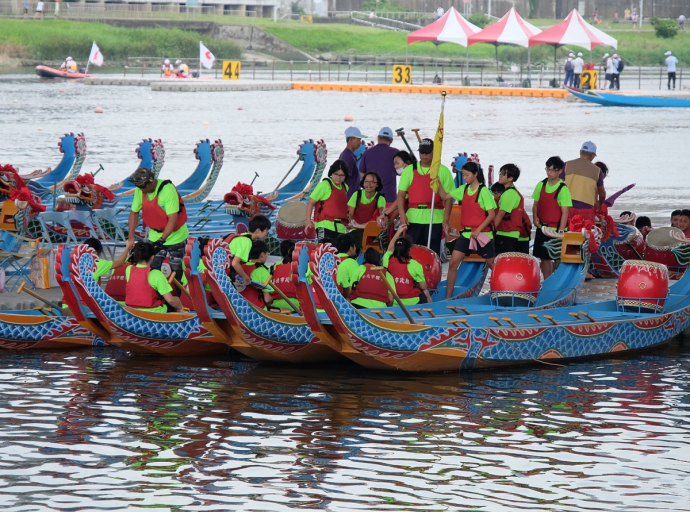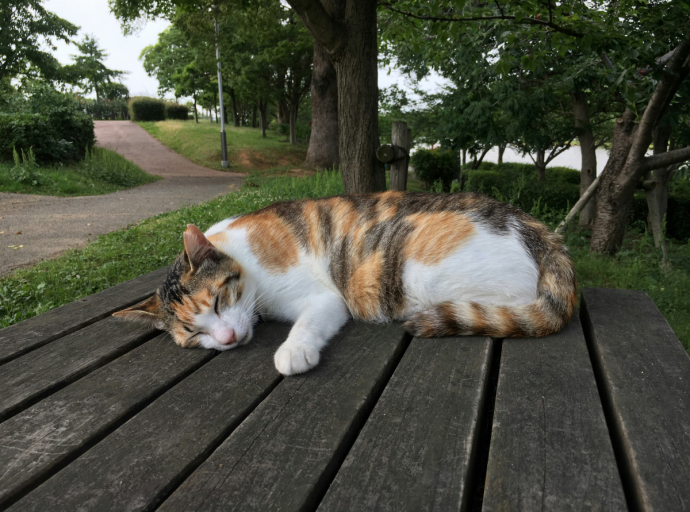[中文版本]
On November 2, 2025, the Finals of the 3rd Washington Chinese Cultural Festival Youth Essay Contest took place at CCACC Boya Academy. Nearly 60 finalists from the Greater Washington area gathered for this challenging and meaningful onsite writing competition. As the first in-person finals in the contest’s history, the event drew a large crowd of students, parents, and teachers. The venue was packed, the atmosphere was electric, and the event marked a rare large-scale live essay competition in the region, becoming one of the most influential cultural writing events for Chinese American youth in recent years.
At 2:00 PM that afternoon, the Award Ceremony began with great fanfare. The winners were announced on the spot, with guests from various communities presenting trophies to the recipients.
A Cultural Bridge Linking You and Me — Young Writers Create a New Chapter
The Washington Chinese Cultural Festival has been held for 23 consecutive years, and is one of the most influential Chinese cultural events in the D.C. metropolitan area. Since 2023, Zaidao (thez.us) has organized the Youth Essay Contest for three consecutive years, aiming to build a bridge of cultural exchange through writing and to provide a platform for young Chinese Americans to showcase their talents and express cultural identity.
As a core event of the Cultural Festival, the contest has continued to grow. Just as Zaidao’s mission states:
“Let writing carry values, let words create friendships; use pen and ink to pass on culture, use language to connect the world.”
This bridge of words is connecting today’s youth with their shared roots and dreams.
The 2025 theme was “The Bridge of Culture Connects You and Me.” A total of 150 students participated—from Maryland, Virginia, Washington D.C., Arizona, Massachusetts, Illinois, California, and even Vietnam. After the preliminary selection, 100 contestants advanced to the finals. Due to logistical limitations, out-of-state contestants could not attend the in-person competition. As a pilot year for the offline format, there was no simultaneous online contest. On November 2, contestants from the D.C. area competed in Chinese and English divisions across elementary, middle, and high school groups.
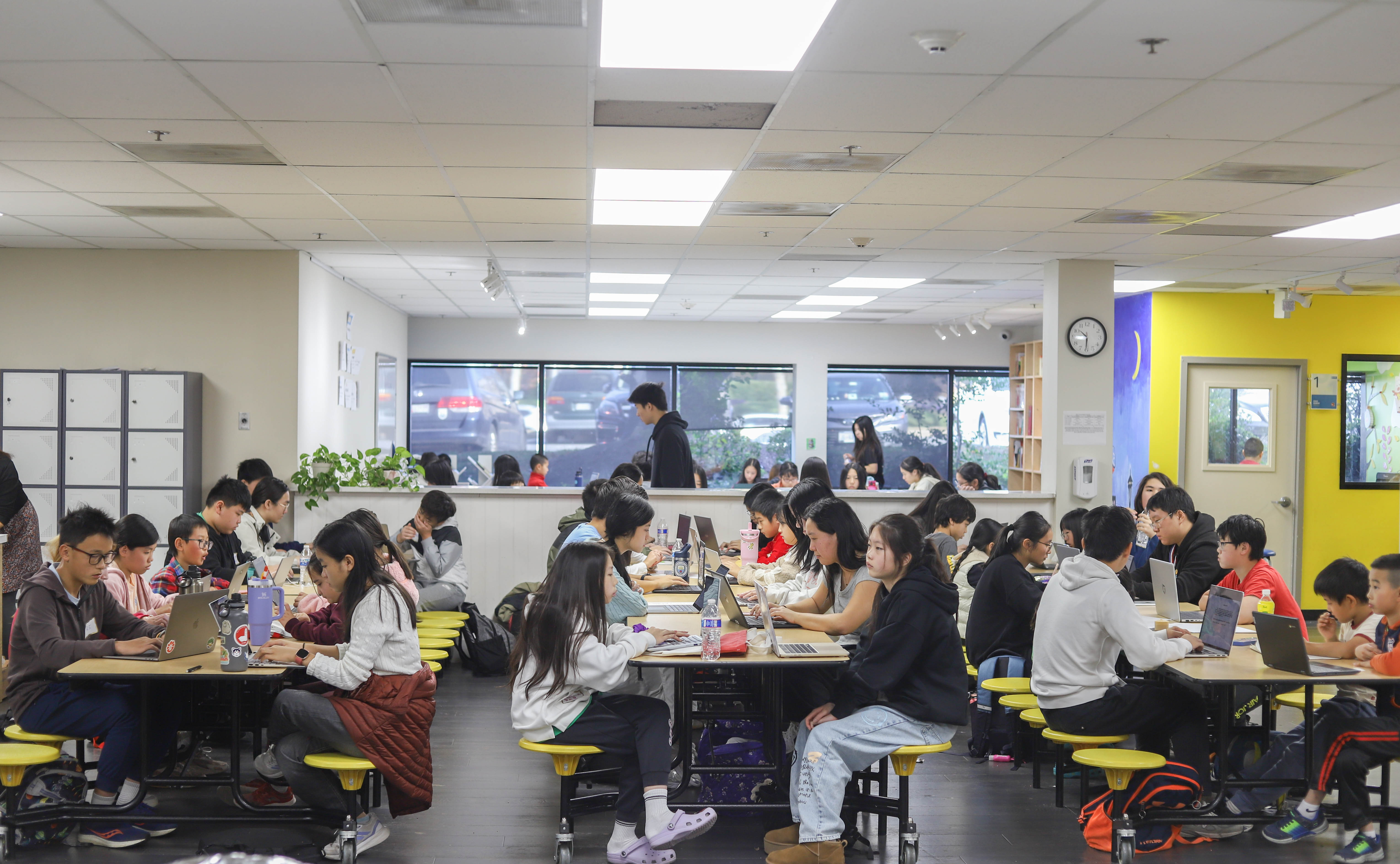
“When I Introduce China to My Friends…”
At 9:30 AM, the competition officially began.
Chief judge of the Chinese division, writer Chen Jiange, announced the rules and revealed the onsite topic:
“When I introduce China to my friends…”
The hall quickly settled into focused silence. The sounds of typing and pen scratching blended together, and ideas flowed into words. Most students typed on computers or iPads, but handwritten work was also encouraged—one elementary student even filled three pages by hand.
An hour later, essays were submitted and the panel of eight judges began their evaluation. After careful reading, scoring, and deliberation, Zaidao staff tabulated the results. Judges remarked that the students demonstrated exceptional writing skills. Whether in Chinese or English, the works reflected strong command of language and sincere cultural perspective.
The judging panel included respected experts and scholars from across the region.
-
Chinese Panel Chair: historian and writer Chen Jiange
-
English Panel Chair: Professor John Noran, senior expert in English writing
Both have served as judges for all three years.
Chinese judges included:
-
Lü Dayu – pioneering CCTV broadcaster, journalist, writer
-
Prof. Li Jie – scholar of journalism and communication
-
Wei Wei – executive principal of New Oriental Family Education, AP Chinese expert
-
Tang Ting – CEO of Yuan Media, journalist
-
Yu Weili – senior editor at CCTV
English judges also included Prof. Fu Ping of Towson University, specializing in film and comparative literature.
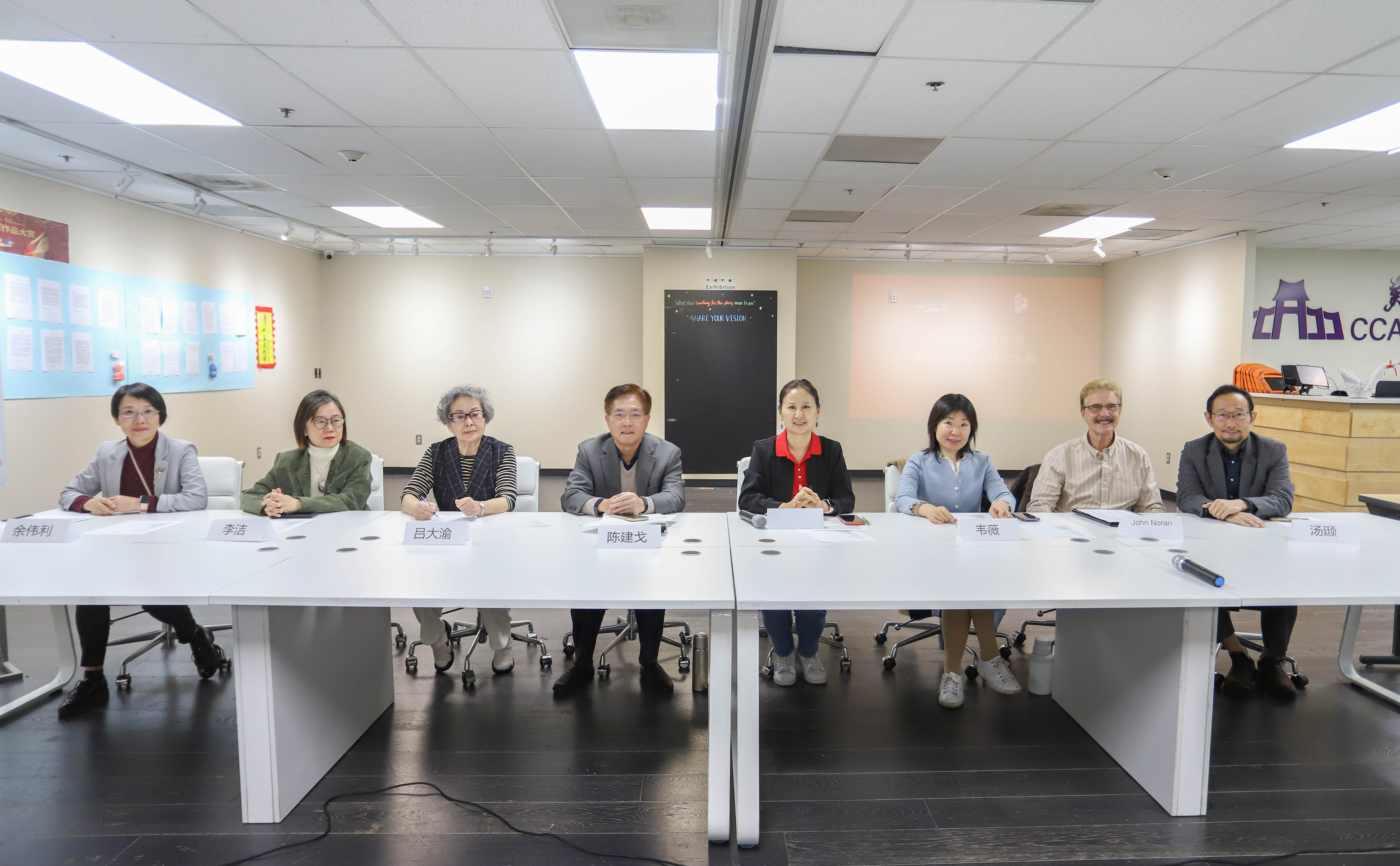
A Full House for the Award Ceremony
At 2:00 PM, the ceremony opened to thunderous applause. The hall was packed—many parents and students stood in the aisles to listen. Under warm lighting, golden trophies shone on the stage.
Zaidao’s three young emcees—Emily Jia, Doris Wang, and Hannah Liu—took the stage with confidence and grace. They introduced the mission of Zaidao:
“We are a group of young people who love Chinese and love writing.
Five years ago, we founded Zaidao to provide a platform for youth to express themselves and improve Chinese writing. We hope to build a bridge connecting the world—especially peers between China and the United States—through words.”
The hosts reviewed Zaidao’s growth—from an online platform to a thriving youth writing community of over 400 young authors and 800 published works. From the first online contest to the third in-person finals, Zaidao continues to innovate and expand its impact.
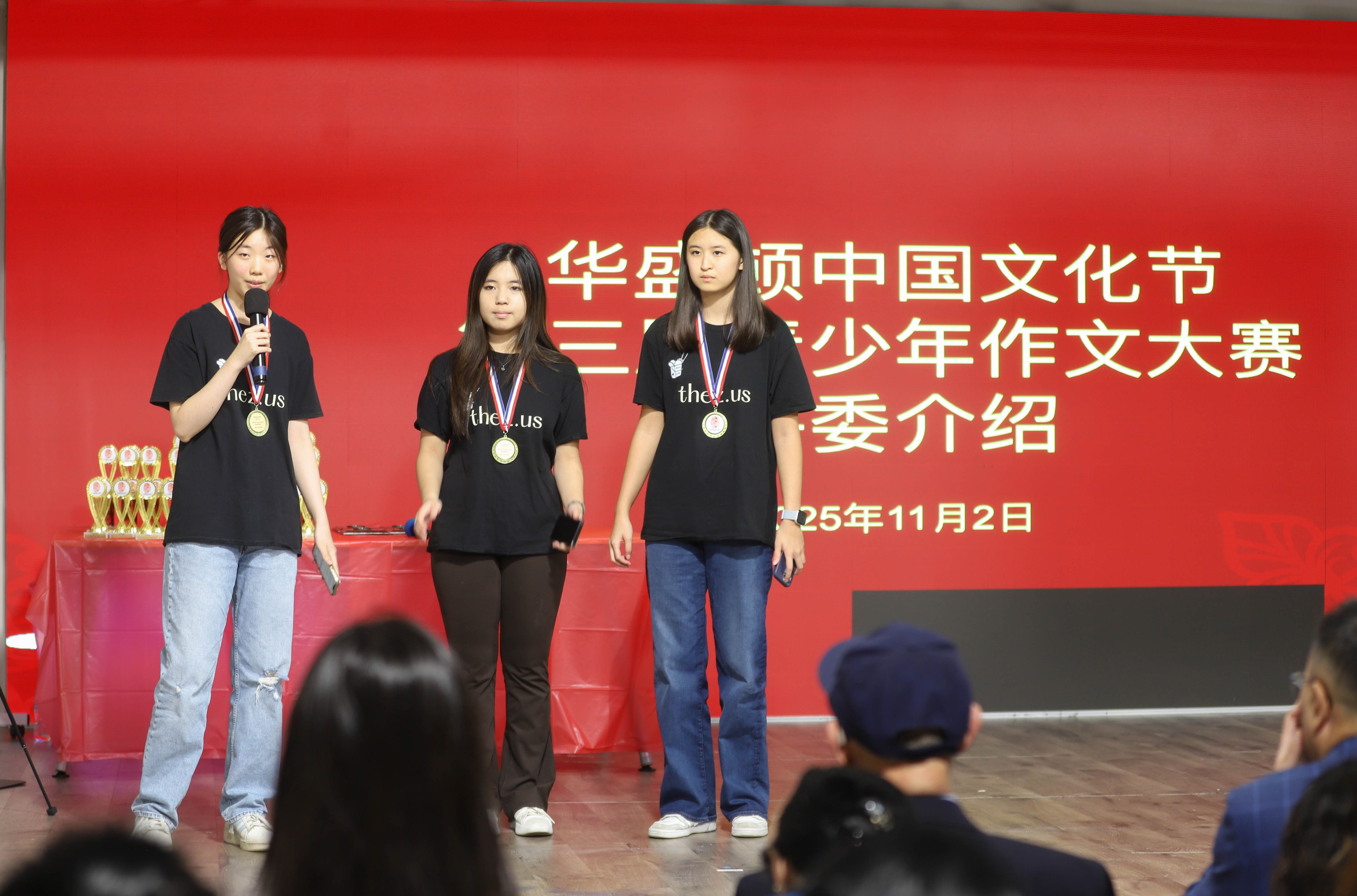
Speeches from community leaders, educators, and government officials brought warmth and excitement. Representatives from Maryland state government, local education systems, and Chinese American organizations offered congratulations and praised the contest’s significance in cultural heritage and youth development.
Counselor Dong Chuanjie from the Chinese Embassy in the U.S. stated:
“The theme ‘A Bridge of Culture Connects You and Me’ carries deep meaning.
We hope to plant the seeds of Chinese culture in the hearts of young people, letting them grow in love and become future cultural ambassadors.
We believe more community leaders and parents will help support this mission.”
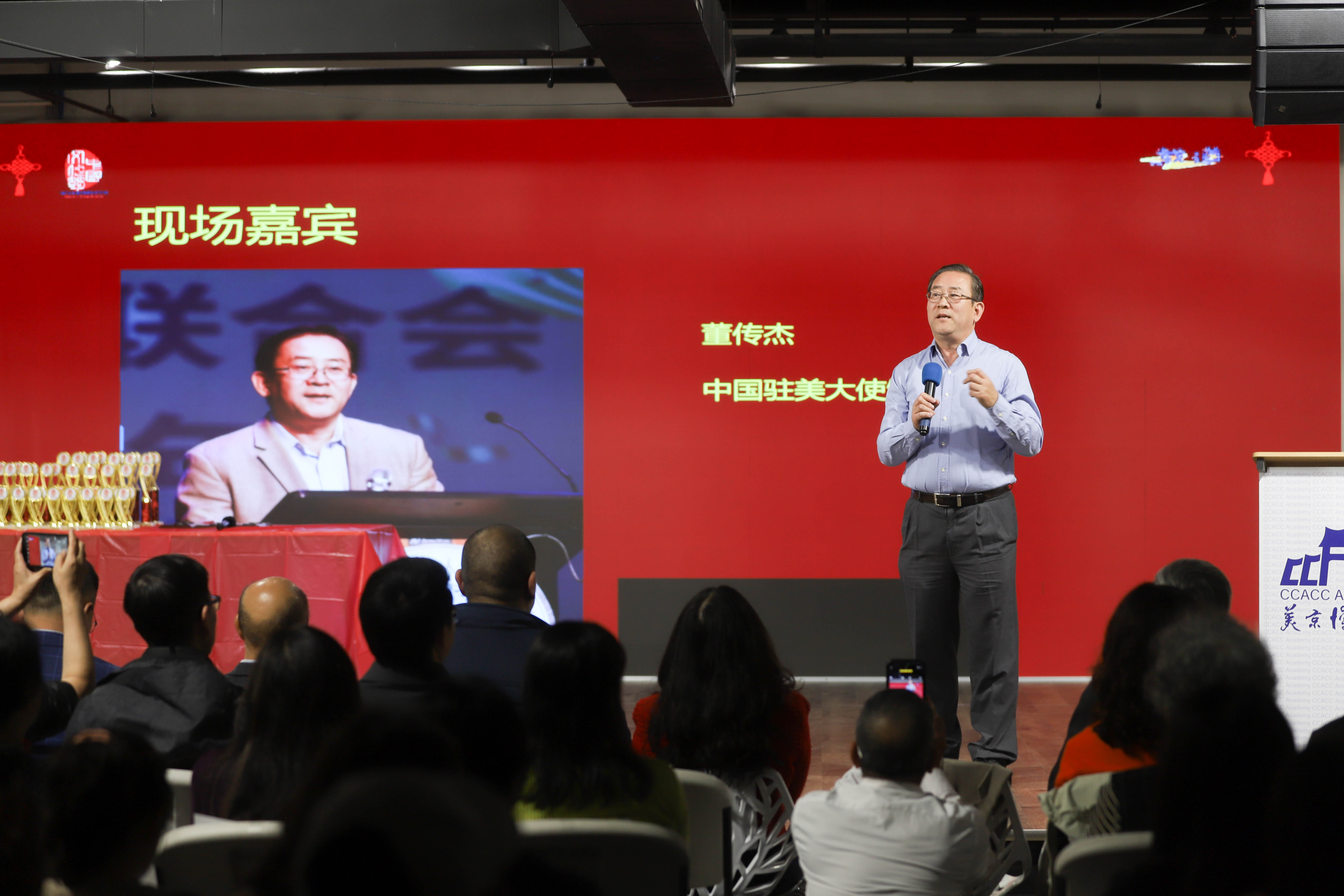
Dozens of leaders and representatives from cultural, educational, and civic institutions also spoke, acknowledging the contest’s excellence and the students’ outstanding achievements. Maryland council member and Rockville mayor sent congratulatory video messages.
The Cultural Festival Executive Chair Li Chuanming presented official certificates on behalf of Maryland State Delegate Dr. Wu Chao. Montgomery County representatives awarded certificates to Zaidao as well.
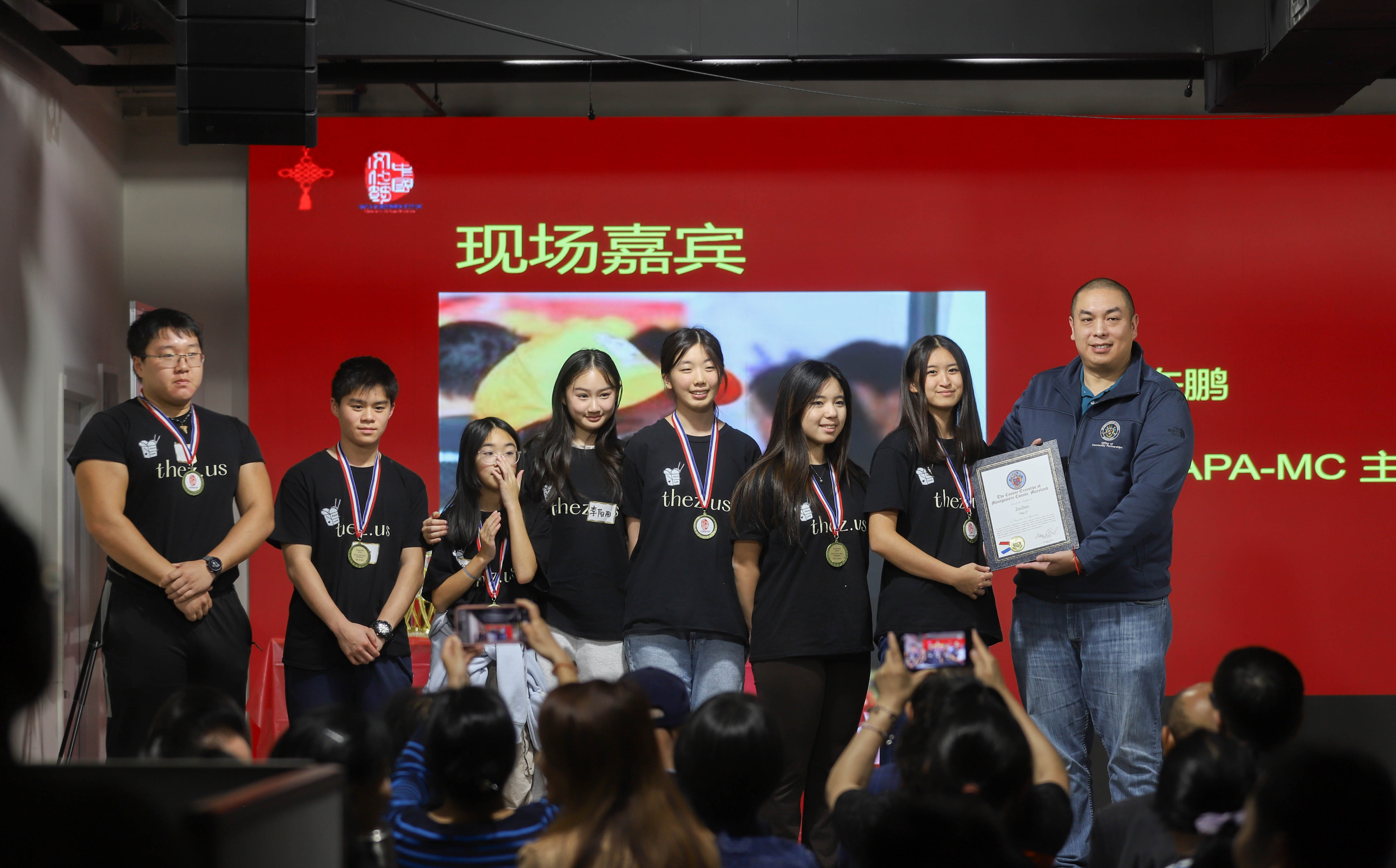
Moments of Honor
The ceremony continued with awards.
“Mentor Award” (Bo Le Award)
Recognizing outstanding teachers who supported the contest.
Gold Award:
-
Hope Chinese School: Cheng Jinglin
-
Hope Chinese School: He Zhufang
-
American Chinese School: Xie Yining
-
American Chinese School: Tian Wen
-
Hope Chinese School: Li Bai
-
Arizona Chinese School: Zhao Xingyang
Silver Award:
-
Hope Chinese School, Chantilly Campus: Zhang Jing, Ma Weiming, Li Xiaolan, Lu Yingping, Sun Ying
-
American Chinese School, Northern Virginia campus: Zhang Hanhui, Huang Yaqi, Zhang Ying, Li Wenping
-
Hope Chinese School, Potomac campus: Du Juan, Wendy Guo, Jingfan Liu
-
Howard Chinese School: Li Nan
-
Baltimore Chinese School: Wei Yan
-
Arizona Modern Chinese School: Deng Chunxia
Additionally, two teachers received the Organization Award for exceptional coordination.
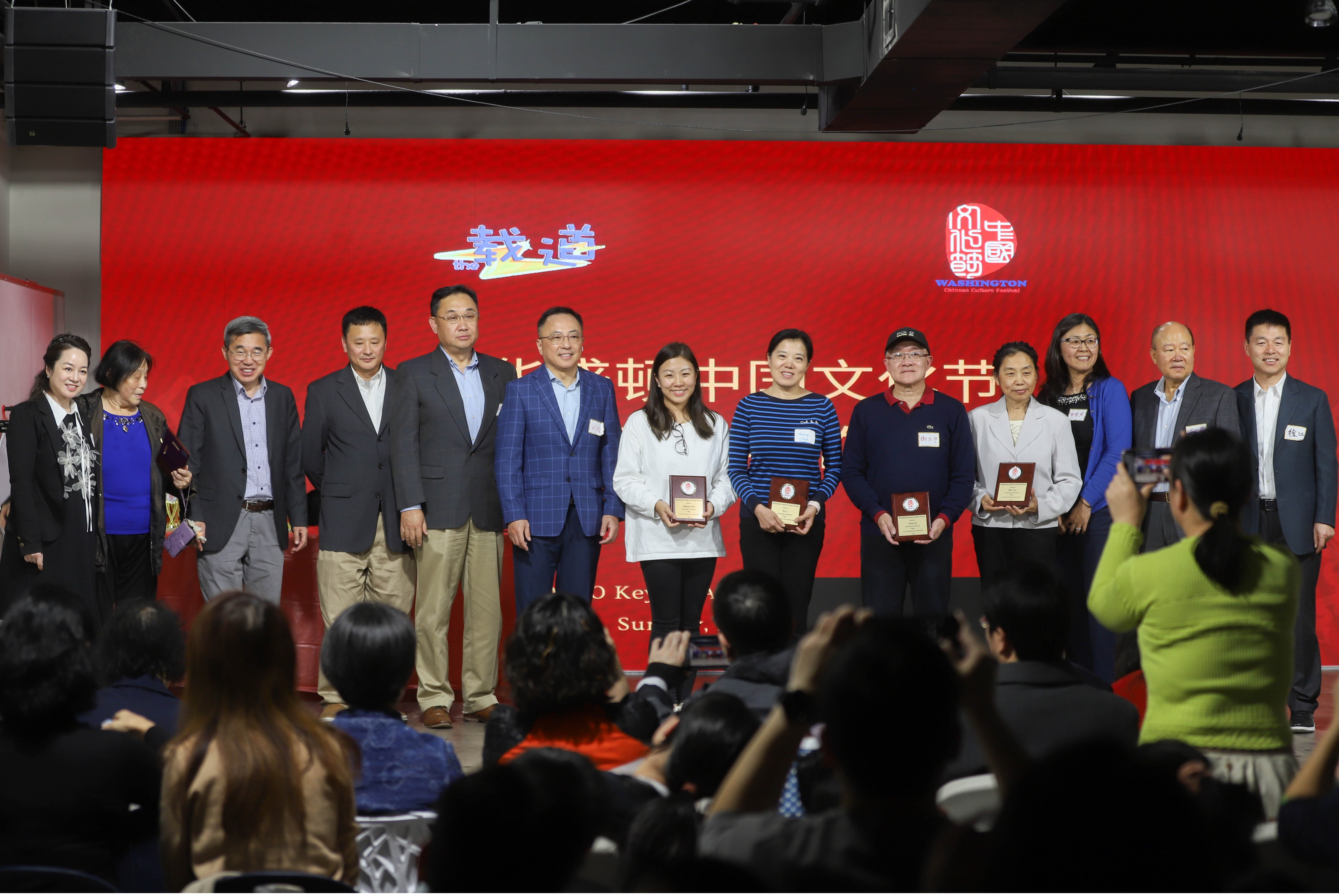
Most Exciting Moment – Contest Winners Announced
Professor John Noran, English panel chair, announced the winners:
-
Elementary First Prize: Claire Zhou
-
Middle School First Prize: Isabella Rose Olvesen
-
High School First Prize: Ella Zhuang
All three were interviewed onstage, sharing their writing inspirations.
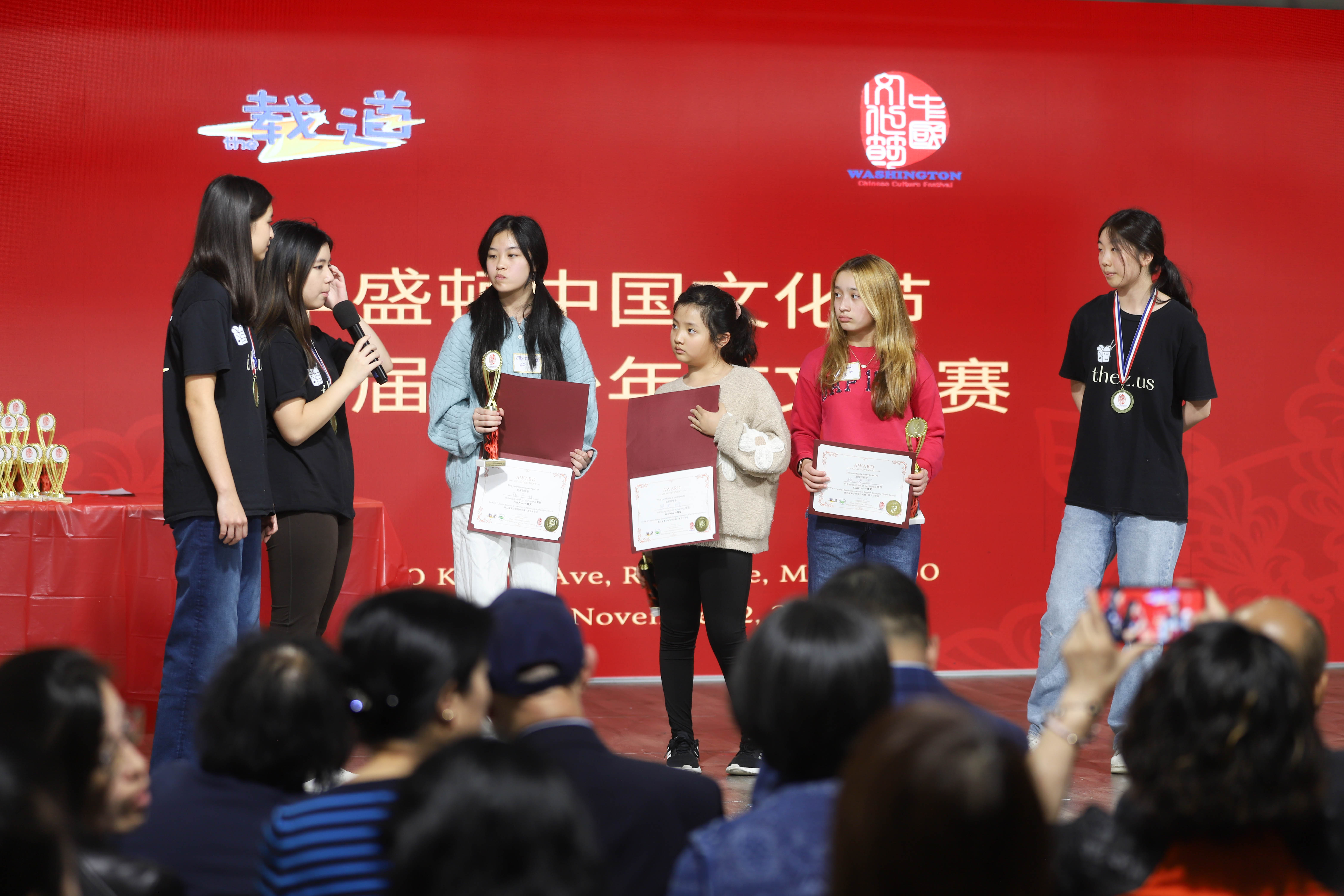
Chinese Division – First Prize Winners
-
High School: Cindy Cai, Rani Wei
-
Middle School: Joshua Liu, Raymond Deng, George Xu
-
Elementary School: Leonard Zhou, David Wang
Judges praised the depth and creativity of these works—from vivid descriptions of Beijing roast duck, to reflections on TikTok and cultural discovery, to imaginative writing about Sun Wukong and Chinese architecture, history, and cuisine.
Embassy officials and distinguished guests presented trophies, certificates, and generous prizes sponsored by the Chinese Embassy.
The ceremony ended with group photos, applause, and celebration.
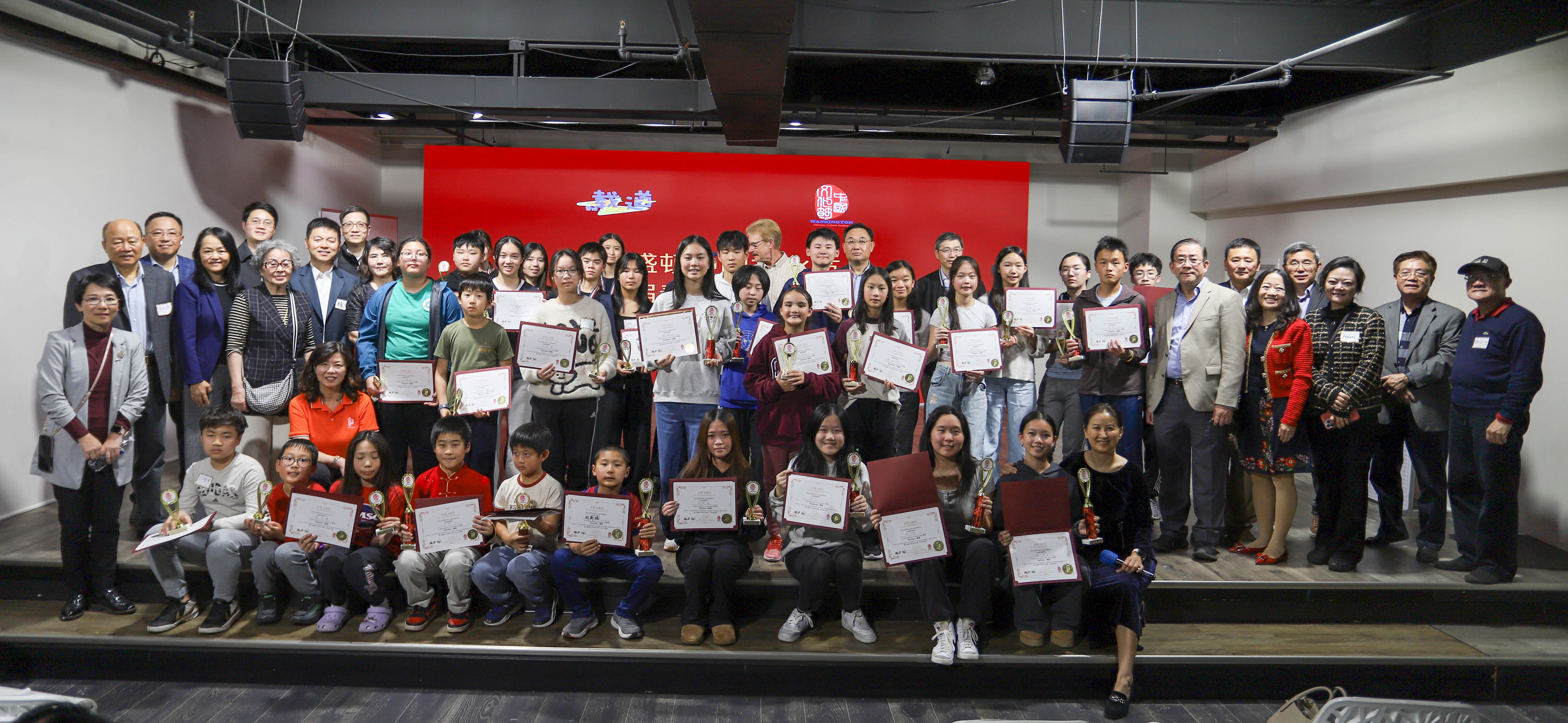
Community Support and Event Activities
The organizers thanked supporting sponsors, including cultural associations, corporations, financial services, law firms, and real-estate investment groups. Donated prizes ranged from Tang poetry desk mats to $500 music courses.
Students from Zaidao also set up:
-
A showcase of past winning essays
-
A charity book and tea sale
-
A cultural trivia game with small prizes
Many students expressed interest in joining Zaidao to continue sharing culture through writing.
Website: http://thez.us
Young writers who love Chinese language and writing are welcome to join.
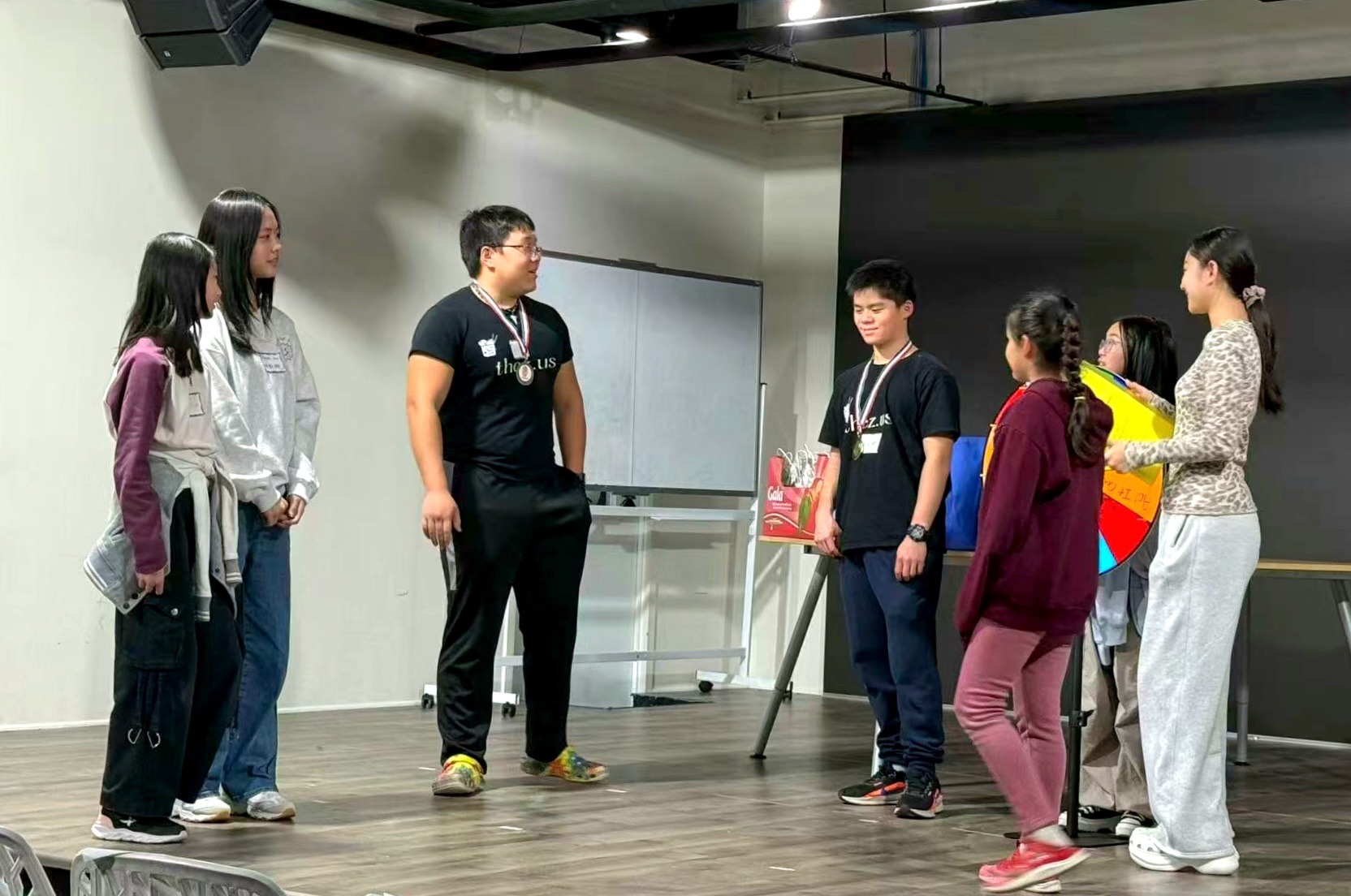
Complete Award List
Chinese Category - High School (26)
First Prize:Cindy Cai 蔡欣妍, Rani Wei 魏子然
Second Prize:Jessica Fu 付天巧, Cameron Wang 王升冉, Jasper Song 宋玉
Third Prize:Nathan Tian 田旻楷, Grace Yeung 杨善谊,Kaylie Liu 刘凯煜,Kate Li 李乐仪,Eric Xia 夏之瑜,Madison Chan 陈姵瑜,Jonathan Jiang 江明远
优胜奖:Ailsa Dai 戴艾莎, Allen Niu 牛啸天, Angela Cheng 郑宇涵, Anna Yao 姚静薇, Claire Qi 齐乐乐, Hailey Cheng 程嘉莉, Jiahao Chen 陈嘉浩, Julia Zhu-Han Pitt 强竹涵, Leah Li 李娅, Nguyen Thanh Tuan Minh 阮成俊明, Paddy Ly 李建毅, Sophia Wang 王琦媛, Than Nguyen Bao Ngan 身阮宝银, Tristan Xu 徐诺
Chinese Category - Middle School (38)
一等奖:Joshua Liu刘睿熙, Raymond Deng 邓睿明, George Xu 许熙麟
二等奖:Kathleen Xin 辛雨薇,Chloe Liang 梁加昱,Miya Zhang 张米娅,Jiachen Wu 伍家辰,Xinyan Lin 林欣妍,Jennifer Xia夏妞妞
三等奖:Serena Ji 季新悦,Eva Qin 秦夏依,Andrew Li 李思哲,Ruohan Du 杜若涵,Zixuan Victoria Qiao 乔梓轩,Katie Huang 黄楚芃 ,William Chung 钟威濓,Vince Cao 曹昀翰,Effy Zhou 周一菲,Jason Jiang江明周,Elizabeth He 贺启慧
优胜奖:Allen Dai 戴艾伦, Andrew Zhao 赵博言, Bella Lee 李贝拉, Clare Zhu 朱可乐, Daniel Huang 黄琦竟, David Li 李源琪, Grace Jiao 焦茹信, Haoxuan Xu 徐浩轩, Kyle Zeng 曾祥天, Leona Ho 何嘉欣, Lexi Tang 邓乐晞, Max Yu 俞豆豆, Serena Pan 潘思瑶, Sophie Chen 陈轩瑶, Sophia Guo 郭烨, Tej Qian 钱太之, Vivienne Sung 宋天欣, Yulong Huan 桓毓隆
Chinese Category - Elementary School (19)
一等奖:Leonard Zhou 周斯杨,David Wang 王大壮
二等奖:Alex Cao 曹可均,Benedict Chen-Bianchetti 陈瀚哲,Kelly Chen 陈凯琳
三等奖:Aimei Cathy Wu 吴艾玫,Gracie Ham 马驰春,Mingyi Sun 孙明义
优胜奖:Amelia Liu 刘芮, Chelsea Wu 伍乔希, Daniel Y. Bu 步云哲, Duola Zhang 张朵拉, Eli Fu 傅梓源, Ellie Liu 刘雪希, Joycelyn Chen 佳佳, Lia Wang 王萦致, Lucas Gu 顾皓元, Noah Chen 陈轩东, William Fu 傅梓航
English Category - High School (6)
一等奖:Ella Zhuang 韩予婕
二等奖:Larissa Deng 邓睿莎
三等奖:Allen Du 杜乐尧, Grace Chen 陈行敏
优胜奖:Grace H Yang 杨格格, Justin Jiang
English Category - Middle School (7)
一等奖:Isabella Rose Olvesen 徐天恩
二等奖:Serena Pan 潘思瑶,Alric Walker 张泽瀚
三等奖:Barbara He 何芳菲,Alex Huang 黄四之
优胜奖:Gloria Teng 滕楚萌, Haohan Wang 王浩瀚
English Category - Elementary School (7)
一等奖:Claire Zhou 周天玥
二等奖:Hannah Leung 梁巧慧,Amelia Liu 刘芮
三等奖:Aiden Chen 陈俊毅,Jerry Wang 王泽睿,Arina Du
优胜奖:Bryan Lai 赖麓飏


